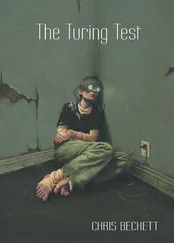The well-lit train rushed back into the darkness.
You are an empty shell, I told myself, as the train opened its doors on Skinner Station. There is nothing inside: no thoughts, no real feelings. No wonder you go to Lucy, an empty shell like you.
There was a pigeon on the platform that had somehow found its way down into the tube. It went to peck at a scrap of food that lay by the feet of a man sitting on a bench, but just as it was getting close, its fear suddenly outweighed its hunger and it scuttled back again, only to turn again and gingerly edge back towards the food.
‘Take care, doors closing,’ said the train.
And with a strange surge of shame and excitement and dread, I realized that without any doubt at all I would get out at the next station, which was in the heart of the Night Quarter, and only five minutes from the house where the ASPUs waited.
I would get out, oh yes. But I wouldn’t get back on the return train to Marija.
I remember a Serbian woman on the escalator in front of me, telling a friend about a trip to the Beacon.
‘There are lights,’ she said, ‘and strange plants, and huge animals, and even a place where it is completely dark except for stars going round and round… and this strange music. That was lovely: the singing stars.’
The syntec receptionist knew me well by now.
‘Good evening Mr Simling, nice to see you. Lucy is in the lounge.’
I plunged into the dark red room, instantaneously blotting out Marija and the strange tube journey and the Beacon, along with everything else in the world outside.
Lucy was looking delectable in a little white lacy negligee.
‘Oh George!’ she cried (Initial Greeting IG: 5439/r), ‘It’s great to see you again! I’ve missed you so much, darling!’
‘I can’t wait to get naked with you again,’ she murmured up in her room, as she ran her thumb, with its imbedded infrared reader, over my credit bracelet.
I put my arms round her, lifting her negligee up above her sweet breasts, kissing her hungrily…
‘Oh I love you, Lucy,’ I couldn’t stop myself from saying it now, ‘I love you, I love you, I love you!’
Twenty-five minutes later it was all over. I had had sex with Lucy. I no longer wanted sex with her. There was nothing more to do than get dressed again and creep off home. (And if I had stayed with Marija we would still be talking and drinking wine and a whole evening would lie ahead, full of strange new possibilities.)
I was bitterly, desperately, disappointed with myself.
And yet when I looked at Lucy, sitting on her bed watching me, I still loved her. I still loved this empty shell, even when the lust was all spent.
‘I love you,’ I whispered, ‘I love you, I love you, I love you.’
Lucy looked at me.
‘What am I?’ she asked.
She spoke in a strange monotone, quite unlike her usual warm and animated voice and her face was blank, like a person in a trance.
‘You are an ASPU, Lucy,’ I said, simply, too surprised to consider my response. ‘You’re a syntec. You’re a kind of machine.’
For about another two seconds, the face remained completely blank and motionless – and then quite abruptly, her normal friendly expression returned.
‘That was really nice George. Will I see you again soon?’
I was with Little Rose, my child-mother, in a leafy suburban street of white clapboard houses. The sun was shining. A yellow aeroplane droned overhead, towing a sign that simply read ‘Having a good time?’
Wholesome-looking housewives were chatting over garden fences, wholesome-looking husbands were fixing cars in the street, wholesome-looking kids on cycles were tossing rolled newspapers into mailboxes. And every one of those wholesome-looking people greeted both Ruth and I.
‘Hi there, Little Rose! How ya doing, George?’
The SenSpace Corporation had introduced another new facility. It was called ‘City without End TM’ because you could move through it indefinitely without ever reaching an edge, although the same pattern of streets, buildings and parks repeated themselves every five virtual kilometres.
Ruth had subscribed to it at once.
The thing about City without End TMwas that you could simply wander through the streets until you found a house you liked that was vacant, and make it your own. (If you found one you liked that wasn’t vacant, you could just jump forward another five kilometres, or another ten, and there its exact copy would be.)
And when you’d chosen your house, SenSpace provided you with a vast catalogue of improvements and fittings to choose from. Wallpapers, paint, carpets, furniture, partition walls, extensions… all could be instantaneously installed, instantaneously replaced. And yet, because this was SenSpace – an illusion not only three-dimensional but tactile – the instantaneous furnishings could really be sat upon and the instantaneous walls really felt hard to the touch.
‘You must come and see my little house, George,’ she kept telling me – and I had finally, reluctantly agreed.
‘Hi there, Little Rose! How ya doing George?’
The neighbours knew who I was because they were ‘extras’: projections of SenSpace like the houses and the trees. Travel five kilometres to the next identical street and you would find exactly the same people, doing exactly the same things, the same again after ten kilometres, after fifteen, after twenty… When someone moved into a house, the extras who inhabited it before were simply deleted. Only in streets fully occupied by SenSpace subscribers, were the fictional neighbours no longer present at all.
But their illusory nature didn’t stop Little Rose from greeting them:
‘Hello there, Gramps… How are you, Bessy…! Don’t miss out my mailbox will you, Delmont?’
And she looked around at me with a pleased smile, almost as if she expected me to be impressed by the number of people she knew.
Only one person in the street did not greet us, and was not greeted by Little Rose. A pale figure in a white suit, he slunk past, avoiding our eyes.
‘Who is that?’ I asked.
She shrugged. ‘A subscriber. He moved in the other day to the house next door but two. It’s a shame, there was a really nice friendly family in there before and…’
But now her face lit up. She gestured towards a little house covered in bright pink roses.
‘There it is! Rose Cottage! What do you think?’
So I was shown the striped wallpaper in the lounge, the yellow-and-white in the hallway, the pink in Little Rose’s cosy bedroom. Her bed with its fluffy pink and white cover really felt soft. The room really had a feminine smell of lavender and talc.
‘This is your room,’ said Little Rose, showing me into a sickly pastiche of the bedroom of an adolescent boy. I cringed and was about to protest when a telephone chirruped downstairs.
I looked at Little Rose. She giggled.
‘Yes, it’s a real phone. I’m in SenSpace so much I’ve got it fixed so I can take calls in here. Will you get it for me?’
The phone, the virtual phone, was ringing in the hallway. The electronic projection of my arm reached out and picked up this electronically created mirage.
But the voice on the end was a real one, coming from the outside world.
‘Is this George Simling? I’m phoning about the advert in the paper. I understand you’re interested in making a purchase?’
It was a woman’s voice with a faint German accent.
‘Advert? No. I think there must be some mistake.’
‘No,’ the voice was very, very firm. ‘There is no mistake. I assure you of that. You were interested in making a purchase. If you’ve changed your mind, of course, that’s fine.’
Читать дальше












